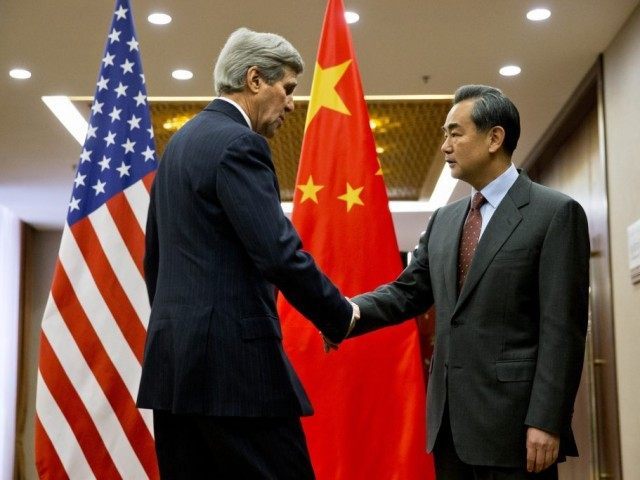“Clearly there is more that they can do,” a source described as “a senior official of the U.S. State Department” by Reuters says of China’s role in curbing North Korean belligerence, particularly following the rogue nation’s claim it had detonated a hydrogen bomb.
The official told Reuters that, during a trip to Beijing this week, Secretary of State John Kerry is expected to pressure China to take on a more aggressive role in condemning North Korea’s military development, which violates numerous United Nations sanctions placed on Pyongyang.
“It is very important to present a united front… but that united front has to be a firm one, not a flaccid one,” the official said, suggesting the response would be “flaccid” without China as a prominent critic. As China is North Korea’s largest ally, and “they have very few avenues for conducting business with the international community that don’t in some fashion involve transiting China,” the official believes that North Korea’s communist regime will continue to survive and behave erratically so long as China provides an economic lifeline.
“Despite the determination and efforts of the Chinese government, clearly there is more that they can do,” the official said, adding that curbing North Korean belligerence required the global community to “cut off avenues of proliferation and retard North Korea’s ability to gain the wherewithal to advance its nuclear and its missile programs.”
South Korean news outlet Yonhap reports that the Obama administration has drafted a United Nations sanctions resolution to present before the UN, according to a South Korean official who protests that, while China’s “initial response” to the North Korean hydrogen bomb claims were stern, “the Chinese side, as has been the case in the past, is extremely slow at first.”
South Korea, as the neighbor in the most immediate danger, has had a stern response to North Korea’s nuclear detonation, which many experts doubt was a hydrogen bomb due to the small magnitude of the quake it created. Last week, South Korean President Park Geun-hye called for multilateral talks excluding North Korea regarding how to most appropriately respond to Pyongyang’s actions. In response to her proposal, Chinese Foreign Ministry spokesman Hong Lei told reporters, “China has always been a supporter of the international nuclear non-proliferation regime, a contributor to peace and stability on the Korean Peninsula and a promoter of resolving issues via dialogue.”
Anticipating a stalled effort on the international stage, South Korea’s National Assembly has proposed a bill condemning North Korea’s human rights record, calling for the creation of “a center tasked with investigating the North’s human rights situation and relevant archives.” The South Korean Unification Ministry has endorsed the bill, stating, “Even if South Korea’s efforts to improve inter-Korean ties and bring peace to the peninsula hit a snag, Seoul should separately make efforts to enhance the North’s human rights situation.”
Experts suggest that China has been slow to respond to North Korean aggression, despite its negative effect on China’s international image, because it has grown to value the relative stability of Kim Jong-un’s dictatorship. One expert tells NK News that China “probably can kick North Korea unconscious by dramatically reducing aid and perhaps even reciprocal trade. However, such drastic measures might very well provoke regime collapse, followed by massive political and military turmoil; clearly, this is not in China’s immediate interests.” He cites senior Chinese officials as describing animosity towards North Korea at extremely high levels, with some even contending that “North Korean actions actually help the United States,” as they make America’s stance against North Korea appear more justified.
Following the nuclear event, North Korea has continued to threaten the United States. “The scientists and technicians of the DPRK are in high spirit to detonate H-bombs of hundreds of Kt and Mt level capable of wiping out the whole territory of the U.S. all at once as it persistently moves to stifle the DPRK, cradle of life and happiness of its people, if only there are no geographical restrictions and provided the territory is vast,” an article in the state Korean Central News Agency read earlier this month.
North Korea has also claimed to hold two U.S. citizens prisoner. Kim Dong Chul, a dual citizen of America and South Korea, appeared on CNN to appeal for intervention from either government, flanked by North Korean soldiers. 21-year-old Otto Frederick Warmbier, a student at the University of Virginia, was arrested last week for allegedly conspiring against the North Korean state. Warmbier has traveled extensively and previously visited another communist prison state, Cuba.

COMMENTS
Please let us know if you're having issues with commenting.